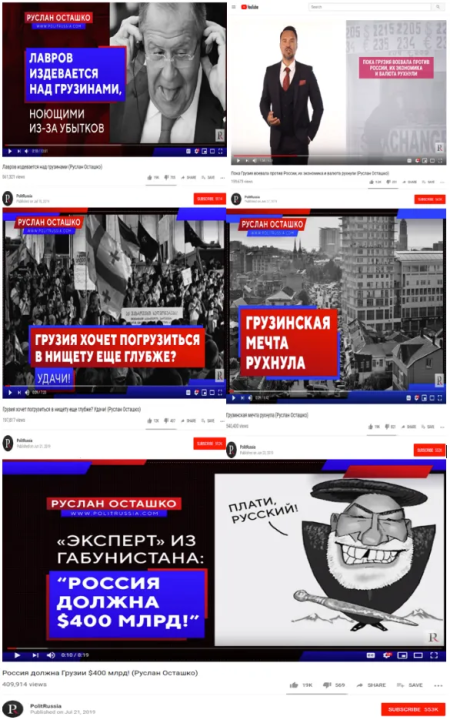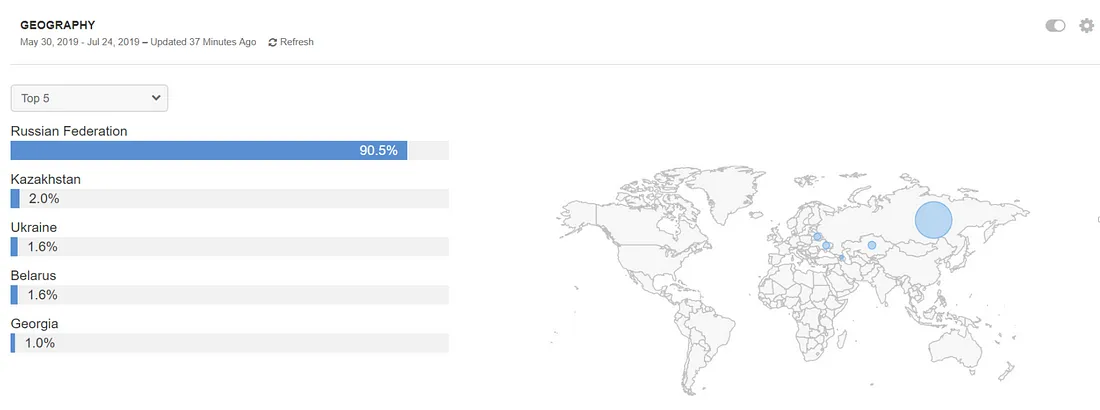Pro-Kremlin outlets issue a false prognosis for Georgia’s economy
Unsubstantiated claims of impending economic collapse emphasize narrative of dependence on Russia
Pro-Kremlin outlets issue a false prognosis for Georgia’s economy

BANNER: (Source: @AleksandreKhun1/DFRLab via Sysomos)
As protests erupted in Tbilisi, Georgia, in response to a Russian Member of Parliament’s address in the Georgian Parliament, pro-Kremlin outlets propagated false narratives on social media focused on the state of the Georgian economy, specifically on the extent of its reliance on Russia.
Relations between Georgia and Russia hit a new low this summer, of which the outrage triggered by the MP’s speech was a clear symptom. (For many Georgians, the speech, delivered in Russian, only highlighted Russia’s continued occupation of Georgian territory, a currently cold conflict with its origins in 2008.) The Kremlin accused Georgia of being a highly Russophobic country, after approximately 10,000 demonstrators took to the streets in Tbilisi to protest Russia’s activities in the country, including the occupation of the regions of South Ossetia and Abkhazia. Pro-Kremlin outlets accelerated political tensions by waging an aggressive disinformation campaign against Georgia, exacerbating worries about the country’s long-lasting exposure to Russia’s information warfare.
In part a reaction to the protests, the narratives around Georgia’s economy that spread on social media complemented the real-world impact of Russian President Vladimir Putin’s decision to suspend passenger flights to Georgia and impose restrictions on Georgian imports to Russia.
Hostile videos targeting Georgia
The DFRLab analyzed videos disseminated by pro-Kremlin media outlets regarding the Georgian economy from June 20, 2019 — the start of the anti-Russia protests in Tbilisi — to July 24, 2019.
Starting on June 20, anti-Western fringe channel PolitRussia published a number of YouTube videos promoting Kremlin narratives that the Georgian economy is doomed to collapse. The majority of the videos on the channel included potentially inflammatory content. For example, on June 27, the channel published a video with the headline “While Georgia Was Fighting Russia, Its Economy and Currency Collapsed.” Ruslan Ostashko, the channel’s main videoblogger and producer, claimed in the video that “Turks and Arabs plan to buy all of the cities in Georgia, constructing entertainment zones with casinos and cheap Georgian whores.” The video reinforced the narrative that the health of the Georgian economy depends on the Russia-Georgia relationship.
The videos published by PolitRussia garnered nearly 2 million views, 80,000 likes, and 2,753 dislikes on YouTube.

To dovetail with his Youtube content, Ostashko has also promoted a opinion-centered campaign filled with hyperbolic and highly subjective assertions on Twitter and VKontakte (VK), a popular Russian social network. On June 20, 2019, he posted a video on both platforms with the headline “The Georgian Dream has collapsed;” in the video, he claimed that the Georgian Dream Party — Georgia’s current ruling party — had turned the port city of Batumi, which is on the country’s Black Sea coast and is a popular tourist destination, into a “cheap whorehouse” and reinforced the narrative that the Georgian government wants to plunge the country deeper into poverty.

Similarly, PolitRussia and RGD News, another propaganda channel, targeted Salome Zurabishvili, the current President of Georgia, following a statement in which she referred to Russia as “an enemy and occupier” causing political instability in Georgia. Both propaganda channels published videos accusing the president of anti-Russian sentiment and stating that sanctions would have a devastating impact on the Georgian economy.

Targeting audiences in Russia
In addition to the videos that were disseminated on YouTube, Russian mainstream and fringe media outlets routinely recycled false narratives targeting Georgia.
The DFRLab used Sysomos to scan for mentions of the Russian phrase “Экономика Грузии” (“economy of Georgia”) on online platforms between May 30 and July 24, 2019. Sysomos registered 1,232 mentions of the term in Russian across all platforms. Daily mentions were zero until June 20, the day of Russian MP Sergei Gavrilov’s visit to the Georgian Parliament that sparked protests in Tblisi. Over the following days, mentions skyrocketed, peaking on June 22. Another subsequent peak was observed on July 8, the day Putin suspended flights to Georgia.

Of the mentions that Sysomos flagged, over 90 percent originated in Russia, 2 percent originated in Kazakhstan, and 1.6 percent originated in both Ukraine and Belarus.

A content analysis of more than 300 articles on economy-related topics within a two-month timeframe revealed that the Russian-language pieces heavily featured negative opinion pieces rather than unbiased news reporting. The opinion pieces largely focused on discrediting Georgia and emphasizing its dependence on Russia. Mainstream as well as fringe pro-Kremlin media outlets in Russian, including Business Gazeta, NovaiaGazeta , Ruposters, and Vedomosti, and tvrain.ru participated in spreading these narratives.
A particularly prominent narrative targeted one of Georgia’s primary exports: wine. An article published on Ria.ru, for example, quoted Genady Onishenko, MP of the Russian Duma and former Chief Sanitary Doctor of the Russian Federation, as saying that “Georgian winemaking and the economy of Georgia as a whole will collapse in the aftermath of a ban on imports to Russia.” This article amassed more 1,700 engagements on Facebook, according to the social media analysis tool BuzzSumo.
These articles supported unprovable qualitative claims by Russian government officials. The Russian Federal Service for the Surveillance of Consumer Rights Protection and Human Welfare, also known as Rospotrebnadzor, released a statement on the deterioration in quality of Georgian wine. The statement indicated that Russian officials had tightened controls over the quality and safety of wine imports after introducing new and unspecified tests in 2017 and monitoring the deterioration of wine import quality since 2014. The timing of the announcement coincided with rising political tensions between Georgia and Russia.
Georgia’s economic outlook
Despite unsubstantiated claims in Russian media outlets, there is no indication that the Georgian economy is expected to collapse as a result of escalating tensions between Georgia and Russia. In 2018, the total amount of money received from Russia through all channels — exports, tourism, remittances — amounted to 10.3 percent of Georgia’s gross domestic product (GDP). Even if Russian sanctions were to target all of these channels, its share in Georgia’s GDP is not large enough to trigger the collapse of country’s economy. Furthermore, a July 2019 report from the National Statistics Office of Georgia indicated an estimated GDP growth rate for the Georgian economy of roughly 5.0 percent in June 2019, one sign of a healthy economy.
More importantly, international financial institutions, for their part, have maintained a positive economic forecast for Georgia in 2019. In particular, the World Bank forecast that the Georgian economy will grow by 4.7 percent in 2019. While a slightly slower rate of growth than in the past two years, it is expected to bounce back to a 5 percent growth rate by 2021.
With regard to wine exports, Georgia has made efforts in recent years to diversify its export markets. A July 2019 report by the Tbilisi-based research firm Galt & Taggart on the state of Georgia’s wine industry noted that, before 2006, 92 percent of Georgian wine exports went to Russia. A 2006 Russian embargo on Georgian wine, however, had the long-term effect of driving the wine sector to improve quality control and build a customer base beyond the Russian market. By 2018, Georgia had expanded its wine exports to 53 countries, with the Russian market now absorbing a much lower 60 percent of total wine exports. The report ultimately concluded that, in the event of another Russian embargo on Georgian wine exports, “redirecting products to alternative markets will not be easy, but achievable.”
Conclusion
Although the protests have eased somewhat in Tbilisi, the information warfare against Georgia shows no signs of abating. To put pressure on Georgia, Russia has taken aim at its economy by suspending flights to the country, thereby discouraging Russian citizens from traveling there, and restricting Georgian imports.
To complement these economic measures, pro-Kremlin media have disseminated narratives about the health of Georgia’s economy, emphasizing its dependence on Russia. Despite their claims, however, independent forecasts on the future of country’s economy suggest that it will likely weather this latest deterioration in the tense Georgia-Russia relationship.
Follow along for more in-depth analysis from our #DigitalSherlocks.

